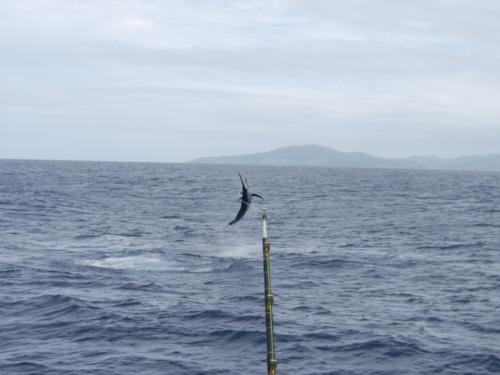
The next time you’re in a restaurant and see marlin on the menu, "just say no." That’s the message of a new, nationwide campaign called "
Take Marlin Off the Menu," which is urging consumers to stop eating marlin, and restaurants to take marlin and other billfish such as sailfish and spearfish off their menus.
Three major marine conservation groups, the International Game Fish Association, the National Coalition for Marine Conservation and the Billfish Foundation have teamed up to draw awareness to the plight of marlin, which are being decimated by commercial overfishing worldwide due in part to continued consumer demand for marlin in U.S. restaurants and at seafood retailers.
Marlin are distinguished by a long bill, an extension of the upper jaw and nasal bone; brilliant colors when "lit up;" and sleek body shapes that allow them to swim at extraordinary speeds. They are highly migratory in nature and can travel great distances, such as crossing the Atlantic Ocean. Like lions, polar bears and eagles, marlin and other billfish are an important, top-of-the-food-chain predator species that help to keep marine ecosystems in balance.
In addition to being endangered, the three marine conservation groups also want to alert consumers and restaurant chefs about the potential health risks of eating marlin meat, which contain higher than normal levels of mercury.
"We want to take a bite out of the commercial fishing of
marlin and other billfish by persuading consumers and restaurant chefs that it’s simply uncool to eat marlin," says Jason Schratwieser, director of conservation for the IGFA, an international recreational fishing organization founded in 1939 that is best known for maintaining freshwater and saltwater sport-fishing records worldwide.
Billfish populations have plunged over the past several decades as a direct result of commercial tuna and swordfish fleets that catch marlin by accident, according to Ellen Peel, president of The Billfish Foundation, a Ft. Lauderdale-based non-profit exclusively dedicated to protecting billfish. Commercial fishing accounts for more than 90 percent of annual
marlin mortality. Many recreational fishermen now practice catch and release of marlin and other billfish, a conservation effort spreading throughout North America.

The "
Take Marlin Off the Menu" campaign is taking aim at U.S. restaurants and grocery stores primarily because the U.S. is the world’s largest importer of
billfish. That’s despite laws that currently make it illegal to commercially harvest marlin, sailfish and spearfish from the Atlantic Ocean.
To add some more bite to the campaign, the "Take Marlin Off the Menu" campaign will promote restaurants and seafood retailers that go "marlin free" by listing those businesses on the campaign’s Web site,
http://www.takemarlinoffthemenu.org. The campaign invites restaurants and seafood retailers to take a "marlin free" pledge in exchange for having the campaign promote those businesses to hundreds of thousands of concerned consumers and recreational anglers throughout the U.S.
The campaign also urges restaurants and seafood retailers to consider carrying more sustainable species such as
mahi mahi, halibut, wild (not farmed) salmon, trout, some types of tuna (albacore and skipjack), and some types of snapper (gray, lane, yellowtail).
"There has never been more urgency than now," says Ken Hinman, president of the National Coalition for Marine Conservation, a Leesburg, Va.-based group comprised of conservation-minded fishermen. "If we don’t stop the widespread consumption of billfish, these magnificent ocean predators will disappear from our seas. It’s simply that critical."
To learn more about the
Take Marlin Off the Menu campaign, visit
www.takemarlinoffthemenu.org